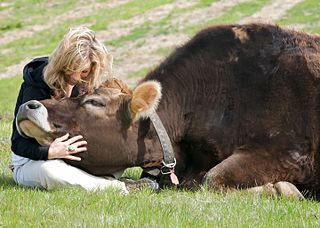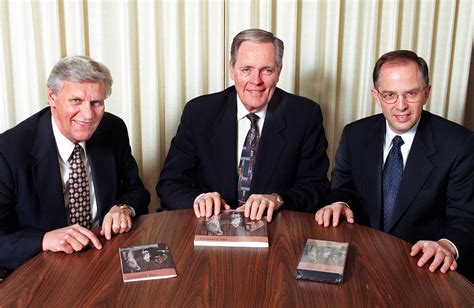A Quote by V. S. Pritchett
Because of the influence of the cinema, most reports or stories of violence are so pictorial that they lack content or meaning. The camera brings them to our eyes, but does not settle them in our minds, nor in time.
Related Quotes
We read novels because we need stories; we crave them; we can’t live without telling them and hearing them. Stories are how we make sense of our lives and of the world. When we’re distressed and go to therapy, our therapist’s job is to help us tell our story. Life doesn’t come with plots; it’s messy and chaotic; life is one damn, inexplicable thing after another. And we can’t have that. We insist on meaning. And so we tell stories so that our lives make sense.
When we turn away from the reality of what we do to animals for our gustatory pleasure, we play a game of pretend, like the child who covers her eyes and thinks you can't see her. And yet, there she remains. Closing our eyes doesn't make violence disappear; it only closes our minds and hearts and enables the violence to continue.
There are three means of believing--by inspiration, by reason, and by custom. Christianity, which is the only rational institution, does yet admit none for its sons who do not believe by inspiration. Nor does it injure reason or custom, or debar them of their proper force; on the contrary, it directs us to open our minds by the proofs of the former, and to confirm our minds by the authority of the latter.
Humanity's legacy of stories and storytelling is the most precious we have. All wisdom is in our stories and songs. A story is how we construct our experiences. At the very simplest, it can be: 'He/she was born, lived, died.' Probably that is the template of our stories - a beginning, middle, and end. This structure is in our minds.
There is a great good in returning to a landscape that has had extraordinary meaning in one's life. It happens that we return to such places in our minds irresistibly. There are certain villages and towns, mountains and plains that, having seen them walked in them lived in them even for a day, we keep forever in the mind's eye. They become indispensable to our well-being; they define us, and we say, I am who I am because I have been there, or there.
To lack confidence is to have feelings of low self-worth. We are preoccupied with our weaknesses, and we lack faith in the Lord's ability to use those weaknesses for our good. We do not understand our inestimable worth in the eyes of God, nor do we appreciate our divine potential. Ironically, both pride and a lack of self-confidence cause us to focus excessively on ourselves and to deny the power of God in our lives.
I think artists can influence only through making music that challenges people, excites them and flips them out. Music that repeats what you know in ever-decreasing derivation, that's unchallenging and unstimulating, deadens our minds, our imagination and our ability to see beyond the hell we find ourselves in.
God's Word must be so strongly fixed in our minds that it becomes the dominant influence in our thoughts, our attitudes, and our actions. One of the most effective ways of influencing our minds is through memorizing Scripture. David said, "I have hidden Your Word in my heart that I might not sin against You" (Psm. 119:11).
I think that cinema and the arts are central in our lives because we grow up and learn about the world through our exposure to stories. Parents use them as a tool to teach their children fundamental truths and values, much as adults can view them to gain exposure to cultures and individuals that they'd never be able to view in their own lives.
It would be worth the while to select our reading, for books are the society we keep; to read only the serenely true; never statistics, nor fiction, nor news, nor reports, nor periodicals, but only great poems, and when they failed, read them again, or perchance write more. Instead of other sacrifice, we might offer up our perfect (teleia) thoughts to the gods daily, in hymns or psalms. For we should be at the helm at least once a day.
...the gross national product does not allow for the health of our children, the quality of their education or the joy of their play. It does not include the beauty of our poetry or the strength of our marriages, the intelligence of our public debate or the integrity of our public officials. It measures neither our wit nor our courage, neither our wisdom nor our learning, neither our compassion nor our devotion to our country, it measures everything in short, except that which makes life worthwhile.






































